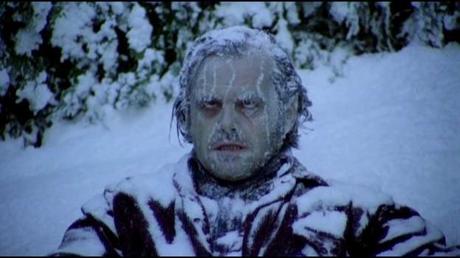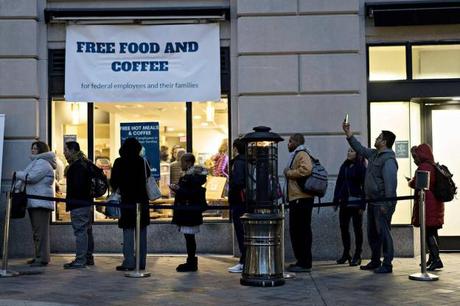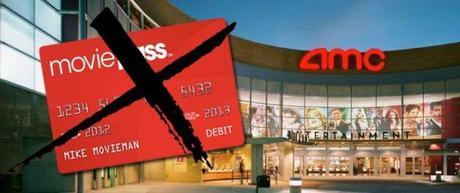S teven Spielberg recently used an acceptance speech to make a plea on behalf of the theatrical moviegoing experience. It's a thing he does a lot these days. Not everyone is listening to him, clearly, because according to The Hollywood Reporter box office revenue for the first seven weeks of 2019 has set an 8-year low. Moreover, we just had the lowest-grossing President's Day weekend in 15 years, calling into question any headline which touts Alita: Battle Angel 's $40m+ opening as a "win." It's a bit of pyrrhic victory to lord over the slowest weekend since G.Dubya's first term.
For context: last year, Black Panther earned a record $243m over President's Day. This year, the highest-grossing movie we've had to this point - - M. Night Shyamalan's Glass - has barely passed the $100m threshold.
This has all been a bit of a rude awakening for Hollywood. After years of stagnating overall revenue and a steady decline in attendance masked by rising ticket prices, 2018 seemed to turn everything around. Not only was business booming but attendance was also genuinely up. For a change, a year-end record-shattering box office total couldn't be entirely explained away by inflation. There were actually more people in theaters - what a concept!
So where did they all go? What, the clock struck 2019 and suddenly everyone decides to take a break from movies? Um, yeah, kind of, but why? Here are 4 potential reasons:
1. The Weather Outside Has Been Frightful
As in "it's been so historically cold multiple people have already died" level frightful. From January into February, the Midwest and Northeast saw their coldest temperatures in two decades. While weather like that usually only has an impact on regional box office totals, it grows into a more significant problem to overall business when it keeps repeating itself and spreads, with the polar vortex seemingly disrupting the entire country.
2. Many Potential Moviegoers Had to Go Without Paychecks
800,000 federal workers and 4 million federal contractors went without pay for 35 days due to the government shutdown. That might represent a drop in the bucket of the U.S. economy's overall workforce, but for the film industry that's not exactly an insignificant number of potential customers who suddenly have no discretionary income.
Historical wisdom is that the film industry is recession-proof and thus not as significantly impacted by cyclical economic downturns, especially as it remains the far cheaper entertainment option when compared to the likes of professional sporting events. However, experts aren't so sure about that anymore, and when this is an industry which sold 1.305 million tickets last year losing guaranteed access to nearly 5 million potential ticket-buyers for an entire month doesn't make things any easier.
3. The Opposite of the MoviePass Bump
Those theater owners who opposed MoviePass did so on two grounds: 1) It's not sustainable; 2) It's going to train our customers to expect movie going to cost a low, monthly fee. Well, they were right about that first part. Were they maybe also right about the second part as well?
It's hard to say for sure because there's never been any solid way to actually quantify the MoviePass bump on attendance. All the data we got from MoviePass was self-reported and often outright disputed by the major theater chains, and given the current state of MoviePass - insert image of flaming garbage fire - it's safe to say their trustworthiness was never really a given.
However, it was always hard to deny that MoviePass, which seemingly jumped overnight from a smaller, 500,000-subscriber service to having a subscriber base somewhere in mid-two million range, was making a difference. How much of a difference, who knows, but a definite difference. Now that it's gone in any meaningful way and competing services like Sinemia and AMC's A-List have yet to completely take off, 2019's box office has suffered.
Imagine, for example, all those people who figured a MoviePass made seeing Liam Neeson in The Commuter totally worth it last January but equally figured it wasn't worth it to pay full price to Neeson see in Cold Pursuit this January. Maybe if the situation had been different Cold Pursuit wouldn't have posted the worst-opening of Neeson's career. There were other variables at play, of course, but it's going to inevitably hurt when you lose an outside entity like MoviePass which was subsidizing people's ticket purchases and thus lowering one significant barrier to entry: cost.
4. The Films Simply Haven't Been Good Enough
I don't know that I've read a single rave review for any of 2019's theatrically-released new movies. Instead, I've read a lot "meh, it's okay, I guess" reviews as well as the always-fun "WTF is this?" takedowns of clunkers like Serenity and Replicas.
This is usually the way of things in January and February, two of Hollywood's biggest dumping grounds for misfit projects. Thus, flops by movies like Miss Bala and The Prodigy which had no real buzz is par for the course, and Glass failing to equal Split's box office is similarly Jack's complete lack of surprise given the ho-hum reviews.
It's been more disappointing to see well-reviewed movies struggle, though. The Lego Movie 2 and Happy Death Day 2U, for example, are each well-liked sequels to well-liked prior films, yet they are each coming in way below box office expectations.
However, given the five-year gap between sequels and faltering box office for the spin-offs Lego Batman Movie and Lego Ninjago WB simply underestimated the extent to which it had saturated the Lego Movie market. Happy Death 2U, meanwhile, aimed to be Valentine's Day horror counterprogramming but proved incapable of cutting through the clutter. Jason Blum will probably find a way to turn a profit on it eventually. It's what he does.
It's a cyclical business. You can never predict how many worthwhile movies you'll get in any year or which ones will hit biggest and or turn into the biggest surprise. In 2019 so far, nothing has really managed to breakout yet.
5. Last Year's Surge in Attendance Was Always Top-Heavy
This doesn't so much explain 2019's downturn as it contextualizes why we maybe shouldn't be so surprised: 18 of the top 20 movies last year were franchise continuations or adaptations of some sort. The other two were Bohemian Rhapsody, an original biopic about one of the biggest bands on Earth, and A Quiet Place, a first-of-its-kind novelty horror movie.
Thus, the formula is clear: give the people not something new but instead something they already kind of know. Then hope for a little bit of good luck, something 2019's films have had in dangerously short supply.
You can follow the formula for the success, but if you fail on execution - make a bad a movie - marketing, timing, or a combination of all three then you're in for a tough road. Thus, even though 2019 has already delivered plenty of sequels (Glass, Happy Death Day 2U, Lego Movie 2) and remakes (Miss Bala, The Upside, What Men Want, Cold Pursuit) with differing levels of individual success the combined output has been historically bad.
Making matters worse: few of 2018's carryover holiday titles have hit in a significant way, at least not on par with Jumanji: Welcome to the Jungle and The Greatest Showman last year, or a Star Wars pic the three previous years. It's pretty much just been Aquaman in that regard, and its impact wasn't significant enough to lift January's overall box office the way prior December hits were able to.
Still, things really aren't that different this year. The box office is carried by the blockbusters, and the numbers they pull in help to cover for how poorly the smaller movies tend to do. With nothing breaking out in 2019 as a blockbuster yet, we're remembering what it looks like when rom-coms like Isn't It Romantic and What Men Want soldier on to domestic totals in the $22m-$37m range. The whole industry is clearly just waiting for Disney to save the day and help make those attendance figures not look so bad.
"This lack has left the industry stuck in neutral as we await the arrival of Captain Marvel, which will begin a much-needed and inevitable revival at the multiplex," says Paul Dergarabedian of Comscore.
Seemingly everything will return to normal as Disney packs audiences in to see Dumbo, Avengers: Endgame, The Lion King, Toy Story 4, Frozen 2 and Star Wars: Episode IX. Revival studios will have hits of their own with films like The Secret Life of Pets 2, Spider-Man: Far From Home, Hobbs & Shaw, It: Chapter 2, Joker and an untitled Jumanji sequel. However, this historically slow start to the year ensures that if 2019 is going to have any hope of topping 2018's record ticket sales we're going to need blockbusters to start popping and fast.

Grew up obsessing over movies and TV shows. Worked in a video store. Minored in film at college because my college didn't offer a film major. Worked in academia for a while. Have been freelance writing and running this blog since 2013. View all posts by Kelly Konda

